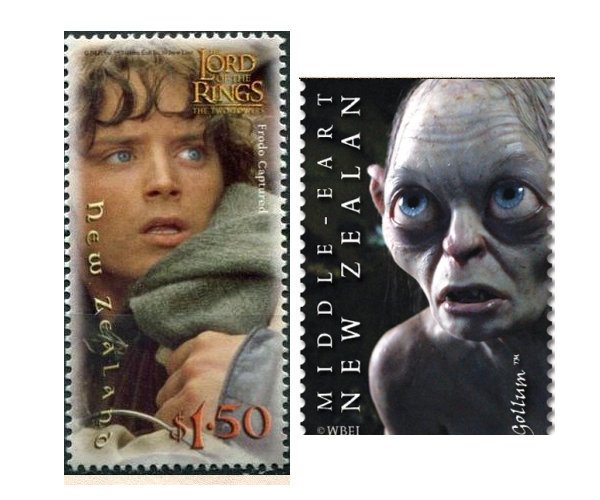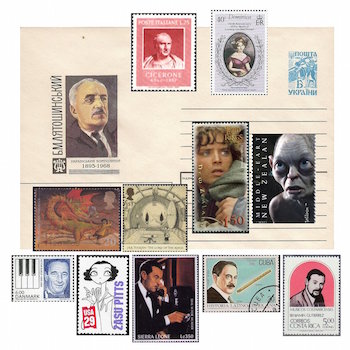The Arts on the Stamps of the World — January 3
Editor’s Note: As a lover a classical music and a stamp collector, Doug Briscoe began some years ago to concentrate on collecting worldwide stamps of composers. Three years ago he had the notion of posting some of these images to Facebook on the composers’ birthdays. Doug found to his surprise that, given the profusion of such stamps, and by expanding to performers, to anniversaries of concert halls and opera houses, to poets whose works had been set to music, etc., he was able to create a post for almost every day of the year. Now the project widens to include all the arts, as Arts Fuse kicks off this new feature.

By Doug Briscoe
January 3rd is the birthday of Cicero, Henriette Sontag, Boris Lyatoshynsky, J. R. R. Tolkien, Victor Borge, ZaSu Pitts, Ray Milland, and two Latin American composers, Daniel Alomía Robles of Peru and Benjamín Gutiérrez of Costa Rica, all of whom have been commemorated on postage stamps (or in Lyatoshynsky’s case, a postal card, which serves as the backdrop for today’s image).
The great Roman philosopher and orator Marcus Tullius Cicero was born on this day in 106 BC and was assassinated on 7 December 43 BC (another day of infamy). The only postage stamp I can find for him is one that was issued by Italy in 1957 for the 2000th anniversary of his death. (Do the math.) Historian Michael Grant has written, “the influence of Cicero upon the history of European literature and ideas greatly exceeds that of any other prose writer in any language.”
The German soprano Henriette Sontag (b. 1806) took part in the premieres of Beethoven’s Ninth Symphony and his Missa Solemnis while she was still in her teens. She was also the first Euryanthe in Weber’s opera of that name and was warmly praised by Berlioz. Born at Koblenz, she was engaged at opera houses Berlin, Paris, and Mexico City—she was the first to sing the new Mexican national anthem in 1854! She had married an Italian count in 1828 and had thus long been Henriette, Countess Rossi, when she performed in the United States in 1852. She died of cholera in Mexico City on 17 June 1854, aged 48. The stamp comes from a Dominican set marking the 150th anniversary of Beethoven’s death.
Boris Lyatoshynsky (3 January 1895 [OS 22 December 1894] – 15 April 15 1968) was born in Zhytomyr, birthplace of Paderewski and Sviatoslav Richter. He studied at the Kiev Conservatory with Glière in 1914, and his graduation composition was his Symphony No. 1 (1918), possibly the first Symphony composed in the Ukraine. Glière led the first performance in 1919. Lyatoshinsky himself became a professor and lecturer at the Conservatory in 1922, moving on to the Moscow Conservatory in 1935. Lyatoshinsky was one of the composers labelled “formalist” (bad), but was not persecuted with quite the vigor reserved for certain other Soviet composers. He even received the Stalin prize in 1946 and again in 1952, and he was allowed to travel abroad with his wife in the 60s. His works include two operas, five symphonies, symphonic poems, chamber, vocal, and piano works, etc. He has no stamp per se, but Ukraine issued this postal card in 1994.
John Ronald Reuel Tolkien (1892 – 2 September 1973) has not personally been recognized with a stamp design in his honor, but Great Britain celebrated the 50th anniversary of the publication of The Lord of the Rings with a set of stamps in 2003, and the films of his works have certainly been a popular topic. New Zealand, where Peter Jackson’s films were largely shot, has produced multiple sheets, and the African nations of Benin and Liberia, seeing a cash cow, have followed suit (images not shown). The UK also put out a Hobbit stamp (at far left) as part of a set of popular children’s books in 1998. One of the 2003 British stamps is next in line, then two stamps from two separate New Zealand sheets.
Danish comedian and musician Victor Borge was born Børge Rosenbaum in Copenhagen on 3 January 1909. He was a piano prodigy, giving his first recital when he was 8. Not long after his first important concert in 1926, Borge began his comedy act, which included anti-Nazi jokes. At the time the Germans occupied Denmark, Borge was performing in Sweden and was able to escape to Finland. He arrived in the US, speaking no English, on the last neutral ship to leave Finland. Under the name Victor Borge, he began a career on radio; he had his own program from 1946 and adopted US citizenship in 1948. His Comedy in Music show ran at the John Golden Theatre in New York for 849 performances, the longest running one-man show in theater history. Victor Borge died in Greenwich, Connecticut, on 23 December 2000 at the age of 91. In accordance with his wishes, some of his ashes are buried there with the rest going to the Western Jewish Cemetery in Copenhagen. Borge was honored by his native Denmark with this 2007 stamp.

ZaSu Pitts (1894 – June 7, 1963) got her name from her father’s sisters Eliza and Susan. It appears the correct pronunciation, according to Pitts herself, is “SAY-zoo” rather than “ZAH-zoo.” After appearing in a number of one-reeler comedies put out by Universal, Pitts was given her first feature-length leading role in King Vidor’s Better Times (1919). Probably her most famous part, though, was in Erich von Stroheim’s magnificent epic Greed. She made the transition into the talkies and last appeared on the silver screen in a small role in It’s a Mad, Mad, Mad, Mad World (1963). ZaSu Pitts was one of four silent film stars to be recognized in a 1994 US stamp issue, as drawn by Al Hirschfeld.
Ray Milland (1907 – 10 March 1986) was a crack shot in the British Army as a cavalryman and airplane (or aeroplane) pilot. His meeting with American actress Estelle Brody led him to consider a career in acting. Among his most celebrated roles were those in The Lost Weekend (1945) and Dial M for Murder (1954), a still from which appears in a Sierra Leonean sheet of stamps commemorating Hitchcock films.
Daniel Alomía Robles (1871 – 17 July 1942) wrote operas and zarzuelas in addition to his hundreds of popular songs. The most famous of these is “El cóndor pasa,” derived from a zarzuela of the same name and popularized (with new lyrics) by Simon and Garfunkel on their 1970 album “Bridge Over Troubled Water.” (Paul Simon heard the song performed by Los Incas in Paris in 1965 and asked their permission to use it.) The composer’s son Armando Robles Godoy is a noted Peruvian film director. The stamp comes from a Cuban set honoring musicians from various Latin-American countries.
Costa Rican composer Benjamín Gutiérrez was born in San José on this date in 1937. He studied in Costa Rica and Guatemala before coming to Boston’s New England Conservatory in the late 50s. He also studied in the US with Darius Milhaud and Ross Lee Finney and in Argentina with Alberto Ginastera. His 1957 opera Marianela is credited as the first opera by a Costa Rican composer. You can learn more here.
A graduate of the University of Massachusetts with a B.A. in English, Doug Briscoe worked in Boston classical music radio, at WCRB, WGBH, and WBUR, for about 25 years, beginning in 1977. He has the curious distinction of having succeeded Robert J. Lurtsema twice, first as host of WGBH’s weekday morning classical music program in 1993, then as host of the weekend program when Robert J.’s health failed in 2000. Doug also wrote liner notes for several of the late Gunther Schuller’s GM Recordings releases as well as program notes for the Boston Classical Orchestra. For the past few years he’s been posting a Facebook “blog” of classical music on stamps of the world, which has now been expanded to encompass all the arts for The Arts Fuse.
